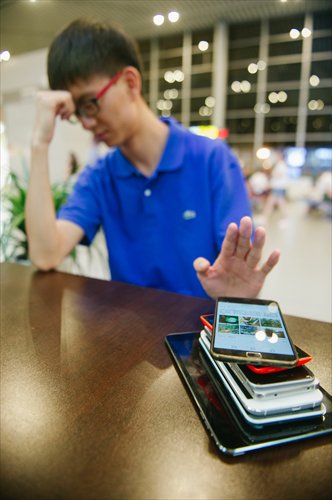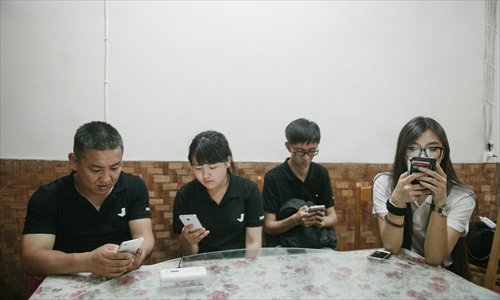Blocking out the buzz
People are spending less time online in favor of more meaningful relationships

Some Chinese people have started to scale back on social media to gain better control over their time and to improve personal relationships. Photo: Li Hao/GT
Yin Haolong had all the best intentions of getting some work done when he sat down at his desk each morning. But he just couldn't stop himself from responding to all his WeChat messages and checking what was happening in his friends' lives on the "moments" stream. Two hours later, he hadn't got any work done.
"I felt like I had been kidnapped by social media, and I can't get away from it," said 27-year-old Yin, founder of a start-up design company.
Yin is not the only one who has felt that social media has negatively impacted on their life.
According to a survey by the 21st Business Herald in April 2014, half of the 500 respondents aged between 16 and 25, believed they were addicted to social media. Sixty-eight percent of them said that they check their social media more than 10 times a day.
Yin, along with a group of young Chinese, decided to regulate their social media usage.
He dubbed his plan "Danshari" (refusal, disposal and separation, suggesting the disposal of mental and physical junk), a concept derived from the book with the same name by Japanese author Hideko Yamashita.
Yin turned off the message alert function on his cellphone, so that he wouldn't feel the need to reach for his phone whenever someone sent him a message on WeChat, Weibo or other social media.
"I didn't cut off social media completely. I just limited the time I spent on it," Yin said. He disciplined himself to only check his social media twice a day.
"I would check once in the morning after I had already finished my urgent tasks at work, and then just before I get off work, I reply to the messages all together. "
To draw public attention to the benefits of cutting off from social media, Yin published an article about his experiences in May on the popular online community douban.com. It has been read 33,750 times.
He also set up a website called wechatoff.com to promote the campaign of "Why I can not respond to your message immediately".
The website has received more than 8,612 hits.

Some people's obsession with social media could lower their work efficiency and lead to narcissism and obsessive compulsive disorders. Photo: Li Hao/GT
The turning point
Before he partially cut himself off from social media in January, Yin had over 500 so-called friends on WeChat, and followed over 1,000 people on Sina Weibo.
He also has a Facebook and a Twitter account.
Although it appeared as if he had hundreds of friends on social media, the reality is that most of them were just acquaintances - people whom he met in a particular situation like at work or a party, but whom he was unlikely to meet again.
"I didn't calculate how much time it was, but I know I wasted a lot of time on social media," Yin said.
According to Yin, his friends on WeChat expect him to reply immediately when they have sent him a message.
Ten chat groups which he belonged to were constantly active with useless small talk.
He said his clients often offer advice on WeChat, but the information is often very random and it took him a lot of time to weed out the useful information from the texts.
Yin also had a compulsion to regularly check his friends' status and to interact with them. "It severely lowered my work efficiency, and took up a lot of time that I could use for more productive things like reading."
The idea to cut himself off from social media originated from two books he read last year, The Simple Guide to a Minimalist Life (2012) and Focus: A Simplicity Manifesto in the Age of Distraction (2010), both by the American writer Leo Babauta.
Since he started to cut down on social media, Yin has finally felt free. He can now arrange his work and social life as he pleases, rather than needing to find the time to reply to random texts.
His attention is also not interrupted by social media. "I have read over 35 books since January this year, while I only read 10 books last year," Yin said.
Yin's friends however, didn't like his self-imposed social media ban. They were constantly asking him why it was taking him so long to reply to their messages.
"I explained to them my idea of cutting myself off from social media and not staying connected all the time. I told them that if it was urgent, they could just call me," Yin said.
After two months, his friends had already become used to it.
Yin said that the cut-off didn't influence his work or personal life at all, because most things on social media are not urgent and can wait 12 hours.
He also believes his friendships have become more meaningful and deeper since he's scaled back on his online time and started spending more time with his friends in person.
Now Yin will ask his friends to go for coffee or to his apartment to cook together.
"We have meaningful conversations. Online chatting could never be as genuine as personal interaction."
To help other participants follow his plan, Yin designed a picture containing his website wechatoff.com and his campaign slogan "Why I can not respond your message immediately," which can be used as a profile picture on social media.
"People who want to practice the social media cut-off can use this picture as their profile portrait, so that their friends will immediately know their intention," Yin said.
Hollow interactions
Feng Gang, a sociologist at Zhejiang University, told Metropolitan that he has seen many young Chinese spend day and night chatting to their friends online.
They post an attention-grabbing personal status to attract more likes from their friends.
"Their entire presence and relationships are based on social media, which seem to allow them more interaction with the outside world, but actually it's all superficial and reflects how hollow and lonesome their lives are," Feng said.
According to a Washington Post report in April, people who are obsessed with social media all experience a slump in their work and study efficiency to varying degrees. They also tend to have symptoms of narcissism, obsessive compulsive disorder, social phobia, hyperactivity and depressive disorders.
With some having opted to cut themselves off from social media, it has prompted some young Chinese to reflect on what social media has done to their lives, said Feng.
"It shows that more young people are starting to see social media from a rational perspective, and realizing that their online interactions aren't as fulfilling as their real-life ones," Feng said.
Cutting yourself off from social media is also a way to live a more minimalist life, said Feng, not only minimizing your possessions, but also cutting down on shallow social relationships and simplifying your life. The focus is on expending your energy on more valuable and meaningful things.
With social media having already become a part of so many people's lives, Feng said it was unrealistic and unnecessary to cut oneself off from social media completely. But as more young people start to see what's really important in life, it is expected that they will get a rational hold of their social media addiction.
Staying connected
Liu Qingtian, 26, a marketing manager at a food company in Beijing, believes it's pointless to cut oneself off from social media.
She thinks that the online world is a great way to communicate with friends, because it's impolite to just call someone up since it might interfere with a meeting or something else.
"Sending a message on social media instead will give that person time to respond," Liu said.
Social media is also a great way to get useful information or just gossip about what others are sharing. "Without that, where is the fun in your life?" asked Liu.
She said people are very busy nowadays and there isn't always time to meet in person. Social media is a great way to stay in touch.
"My boss also discusses work and convenes informal meetings with us on WeChat. I could lose my job if I just ignore my WeChat," Liu said.
In response to Liu's view, Yin argued that besides for work purposes, social media has too many temptations which could distract employees. He also doesn't think it's an efficient way to communicate with teams.
"You could try to have two WeChat accounts, one just for work to avoid distractions, or try other software specifically designed for team communication," Yin suggested.
Yin believes it's not necessary to stay connected to social media all the time, no matter for what purposes. He believes it will sap you of your energy.
"You need to venture out, examine your life and think about what's really important," he said.